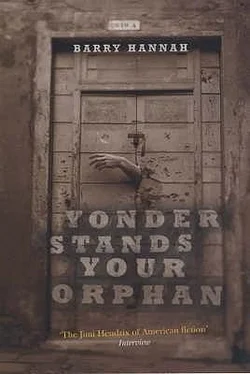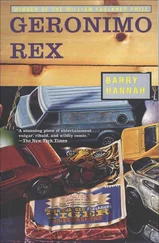“I will tell your mother and father what you do with me,” she said once.
“You’re not even going to see them. Don’t be an idiot. You’re not here against your will.”
“Some of it. I’m thirteen.”
“Get back in the book. Nobody’s hurt you.”
“You and me, old man, are orphans from normal. Remember? But I can change.”
“Stay quiet and you can be anything you want.”
“We’ll see.”
A curious pause on the front porch of the bait store. Mortimer’s yellow Lexus parked, no others. Dark clouds but not a speck of rain, only this deep shadow. Raymond and Roman could see Mortimer and Sidney at the counter inside peering into a glass-lidded case full of knives on velvet. They seemed at church. Not yet touching these treasures.
See this little man, the high wavy bush of hair, the thin ankles in tasseled and buckled moccasins that seemed trimmed with actual coral snakeskin. Raymond and Roman had meant to buy supplies for crappie fishing on Harvard’s launch, then have some talk of cancer, music, the history of Roman’s Indian tribe, Jesus Christ as a man of the whip, taking time to make it right there in the temple. Raymond had not known a black man since the days of southern apartheid, although he called their names.
The fifties. In Raymond’s small town, there was a tiny college campus on which the faculty and students lived in three-storied Edwardian brick houses. The snow and then vicious ice had been on three days, a storm of the century for where they lived, in southern Mississippi near the capital city. A professor’s house caught fire. He was a veteran and had brought back live German rounds and weaponry in glass cases. It was not clear whether he just taught Nazis or taught them because he loved them, their flags, their helmets. Much of this ambiguity in the early fifties.
The water pipes were frozen. Nothing to do but throw snowballs into the fire engulfing the professor’s house. Then they saw the glass cases, and the bullets began exploding. Two men were scraped, the crowd widened. A hopeless single fire truck, officious yokels wringing their hands but having fun too. Germany rearing up on three stories and blowing its flak around. Raymond had no better memory. That evening of the fire and the booms and the thrilled citizens, a bullet of the Reich could touch anybody. The professor might be in there, on fire and lecturing.
What I am, thought Max Raymond suddenly, is an overprepared man. Here I am back at the burning place, where I keep returning ever since I was eleven. Shiloh. Where man meets God, but the man has come too early and wearing the wrong things. I have suffered. If you are able to explain suffering, a man once told him, you weren’t really there.
Raymond stood ashamed before Mortimer. A bootlicker to a phantom.
John Roman was also humiliated to meet his attacker. Getting shot was nothing like this. This little man had his number.
“Hello, Man,” Roman said, surprising himself. He and Raymond watched Mortimer climbing down from the stool. A head with his wig, exempted from blame, by a shape totally shifted into sickness. He might as well be a little girl, almost unbalanced by his large hair. Maybe he didn’t remember Roman.
Raymond and Roman moved off as Mortimer and Sidney laid hands on the glass. Eloquent hilts. Arcs and stilettos, a near sickle, smaller but heavy in the blade like a bolo. A sickness sat in the room, which they each seemed to have agreed not to discuss. Their faces blank, the men acted as though they had never met.
Mortimer said something had to be done, these evil children were all over the place. Uptown, other towns. Some had been making nude movies, was the rumor. Nobody had much shame left. Mortimer smiled ear to ear.
“I picked you up this tonic. Brings up the immune system, said the old boy at the herb store. I’m feeling better for it myself. Feistier. Heart’s back in my projects,” Man said.
“You ain’t looking it. You poorly.”
“We ain’t old yet.”
“I am, and sick as a dog,” Sidney lied. He awoke nowadays with a fine mean on.
But Sidney knew sickness. The way you could sink inside yourself and worship it. Shock them by your dilapidation yet refuse to fall.
Mortimer’s people had changed too. They were not as stupid as he thought. They had their own righteousness. They were no longer amazed by the excesses of his career. The SUVs, the strange empty homes, the small film production concern in Clinton. He knew they expected sin close to him. When he left for business, he saw pain in their looks.
His old man was interested most in the junkyard, where he played quarter poker with Peden. His man Peden, in the shotgun house, whom Mortimer was allowing to live unmaimed. Peden and Mr. Mortimer played cards and talked fifties automobiles.
Mortimer tried to find his mother a hobby, but her eyesight was not good and she preferred silence. It bathed her, she said. She loved telling clean, pointless stories in which her struggles were the only memorable thing. Changing a tire on her own and finding a neighborhood dog nestled in with a family of coyotes. The old woman had insight too. When he brought little Irma past his folks at his SUV agency and told them she was the granddaughter of a client, Mrs. Mortimer’s face went red.
Still, she said they loved him and owed him for being stupid about his needs in Missouri. She agreed how a chicken yard in back could humiliate a boy who needed cars and girlfriends. How they went to church too much, expecting the pastor to correct all troubles straight from the pulpit, and how some of these pastors were fools who had barely entered life before they began announcing on it. She hugged Mortimer over and over now, commenting on his new white hair.
He felt something for her and his father. It was intense, this feeling, a fresh one for him. Made him nervous and awkward around them. He gave aid needlessly, as out of a tube of charity inside his heart. He sat with them, saying nothing, three porch-bound elders watching for cars at the four-way stop.
At the house Mortimer finally had finished for them in Rolling Fork, they sat for three hours without a peep. Mortimer’s new shoes the only true expression hereabouts. Penny loafers, black, the leather stamped with leaping trout.
The house was plush leather furniture, gold and bright copper hardware set next to black for kitchen and bathroom fixtures. Stinking of fiberglass and new wool on the floors.
After the silence, while he was leaving, he said, “I’m happy we got all that cleared up.”
They laughed their first laugh together.
Mortimer drove to Big Mart to buy his mother flowers for her sitting room where she actually sat as if friends might arrive any second. He pulled up behind a man loading topsoil. Mortimer thought he recognized him, Bertha’s nephew Ronny, whose body shop he had used. The man did not know who Mortimer was, now in a Rolls Land Rover stolen in San Francisco. The man kept loading the topsoil in front of Mortimer’s windshield, with his car door out in the passing lane. Mortimer could not move, yet he was practicing patience, thought, depth. Then he put his face out the window and asked, “Would you shut the door so I can get by, please?”
A look of disgust crossed the man’s face. Mortimer reached to his ashtray, put on his new ring. He had lately been interested in the concept of irony . How on the face of others it meant insult, such as Pepper had shown him before his beheading. The man had figured Mortimer to be a small irrelevance. This man closed the car door with that irony on his face. He was, after all, a busy foreman at the body shop now. Who was this skinny sissy with big hair in his tank of a car? Mortimer saw all this. Then stopped his car in front of the man’s. “Excuse me, sir. Would that be a look of irony on your face? Would you be giving me irony right now?”
Читать дальше











